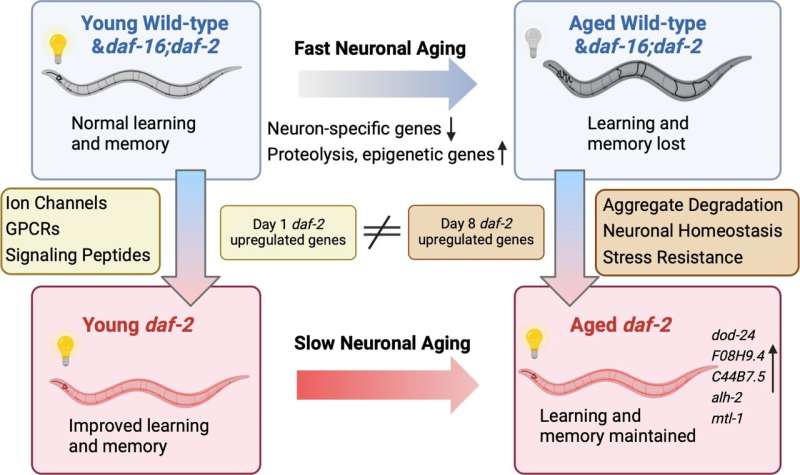This article has been reviewed according to Science X's editorial process and policies. Editors have highlighted the following attributes while ensuring the content's credibility:
fact-checked
peer-reviewed publication
trusted source
proofread
Study identifies gene targets to combat cognitive decline

Researchers have identified the possible mechanisms by which long-lived mutants of the model system Caenorhabditis elegans are able to maintain learning and memory later in life while some experience cognitive decline.
The study, published in eLife, provides compelling evidence for the mechanisms by which C. elegans worms with a mutation in the daf-2 gene maintain cognitive function later in life better than their typical counterparts.
The findings could inform strategies to combat the cognitive decline associated with aging in humans.
"As our society ages, cognitive decline is becoming an increasingly significant public health concern, with global cases of dementia expected to triple by 2050 according to research presented at the 2021 Alzheimer's Association International Conference," says lead author Yifei Weng, doctoral candidate in the Department of Molecular Biology, Princeton University.
"Understanding and preventing the underlying issues of neuronal structure and behavioral decline associated with aging is therefore crucial for societal health."
C. elegans is a commonly used model organism in biology, and is particularly useful for studying the effects of aging, given its simple nervous system and short lifespan. Many of the genes for neuronal function in mammals are conserved in C. elegans, making discoveries in the species potentially applicable to humans.
The Insulin/IGF-1-like signaling (IIS)/FOXO pathway is a signaling system that regulates growth, metabolism and lifespan, and is highly conserved across species.
The daf-2 Insulin/IGF-1 receptor is a key part of this pathway—worms with a genetic mutation in this receptor (daf-2 worms) both have better memory in early adulthood and also show a significant extension of learning and memory span with age, although the mechanisms by which the latter occurs are not yet understood.
Therefore, Weng and colleagues sought to identify how aging daf-2 worms stave off cognitive decline in older age.
First, they investigated the changes in gene expression that typically occur in C. elegans neurons. They used a sequencing technique called RNA-seq to analyze neurons isolated from adult worms at days one and eight of adulthood—when the worms have already lost learning and memory capacity.
In the aged worms, they observed decreased activity in genes related to neuronal function, and increased activity in genes involved in protein breakdown, production and gene regulation. To test whether specific increased expression of these genes with age was advantageous or disadvantageous, the team reduced the expression of three genes whose activity is higher in aged animals and performed behavioral assays.
Reducing the expression of each of the three genes improved the memory performance of the worms. This indicates that some neuronal genes that increase with age can have a negative impact on learning and memory, and reducing their expression may be beneficial to the animal.
The extended cognitive ability of daf-2 worms has previously been shown to be reliant on the DAF-16/FOXO transcription factor. So, the team compared the genetic profile of neurons isolated from 8-day-old daf-2 worms with those isolated from worms of the same age with a loss-of-function mutation of the DAF-16 transcription factor (daf-16;daf-2 worms).
They observed 570 upregulated and 814 downregulated genes in the daf-2 neurons compared to those from the daf-16;daf-2 worms. Many of the upregulated genes were related to stress responses, including heat stress, oxidative stress, metal stress, and proteolysis—a process that involves genes helping to break down proteins and that is essential for maintaining cellular health and function.
To confirm this, the team reduced the expression of the eight most likely responsible genes in C. elegans to assess their effect on cognitive function. Of the eight genes tested, the reduction of three of them significantly reduced the worms' learning ability. Those genes, plus the reduction of two additional genes—C44B7.5 and alh-2—significantly reduced the worms' short-term memory capacity.
Perhaps even more interestingly, daf-2-regulated genes in aged neurons do not match those from young neurons—that is, they are new targets of the IIS/FOXO pathway. The team found that of the top 100 upregulated genes, 36 have corresponding genes in mammals. Of these 36 genes with conserved protein in mammals, 32 of them (89%) have been found to have functions in promoting neuronal health.
These mammalian homologs protect neurons against protein aggregation and harmful metabolites, maintain synaptic organization and neuronal homeostasis, facilitate neuronal injury repair, and maintain normal neuronal function.
Together, these genes may be neuroprotective and protect neurons from accumulation of environmental harm during aging, a new mechanism by which daf-2 worms protect their neurons with age.
"Our data suggest that genes that are differentially regulated in 8-day-old daf-2 mutants may aid in slowing neuronal function decline and behavioral changes associated with aging," says senior author Coleen Murphy, Director of the Lewis-Sigler Institute of Integrative Genomics and Professor of Molecular Biology at Princeton University.
"Furthermore, memory maintenance with age might require additional genes that function in promoting stress resistance and neuronal resilience."
"This study provides a greater understanding of the mechanisms underlying neuronal aging, and could provide useful insights to aid the development of aging interventions," adds Weng.
More information: Yifei Weng et al, The Neuron-specific IIS/FOXO Transcriptome in Aged Animals Reveals Regulatory Mechanisms of Cognitive Aging, eLife (2024). DOI: 10.7554/eLife.95621.3
Journal information: eLife
Provided by eLife





















